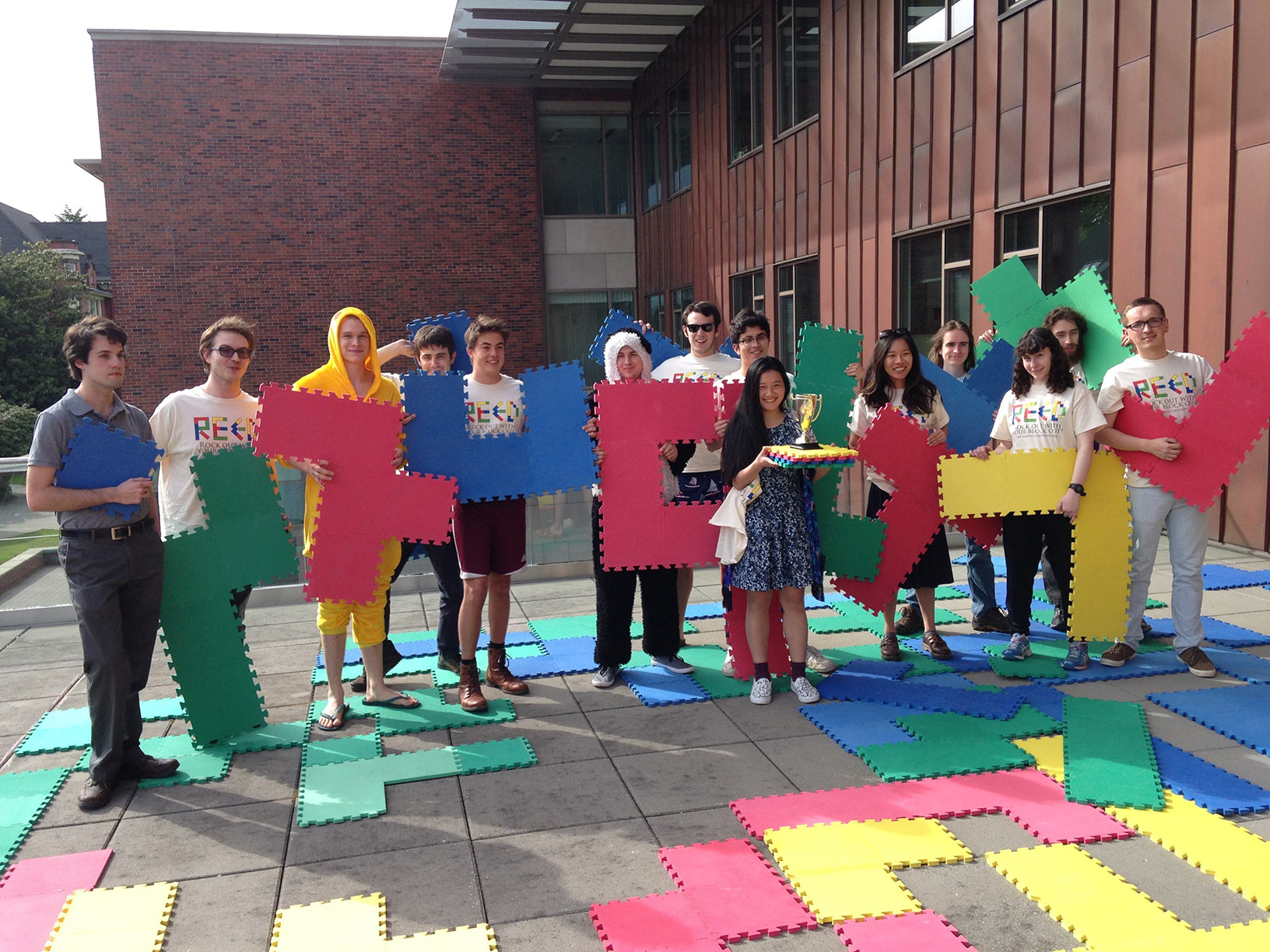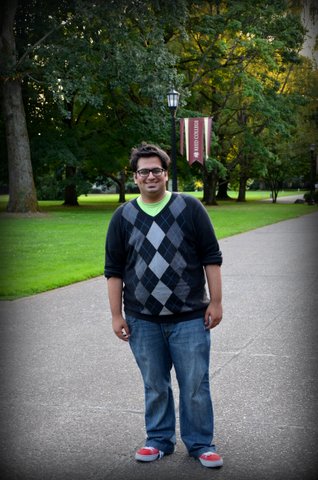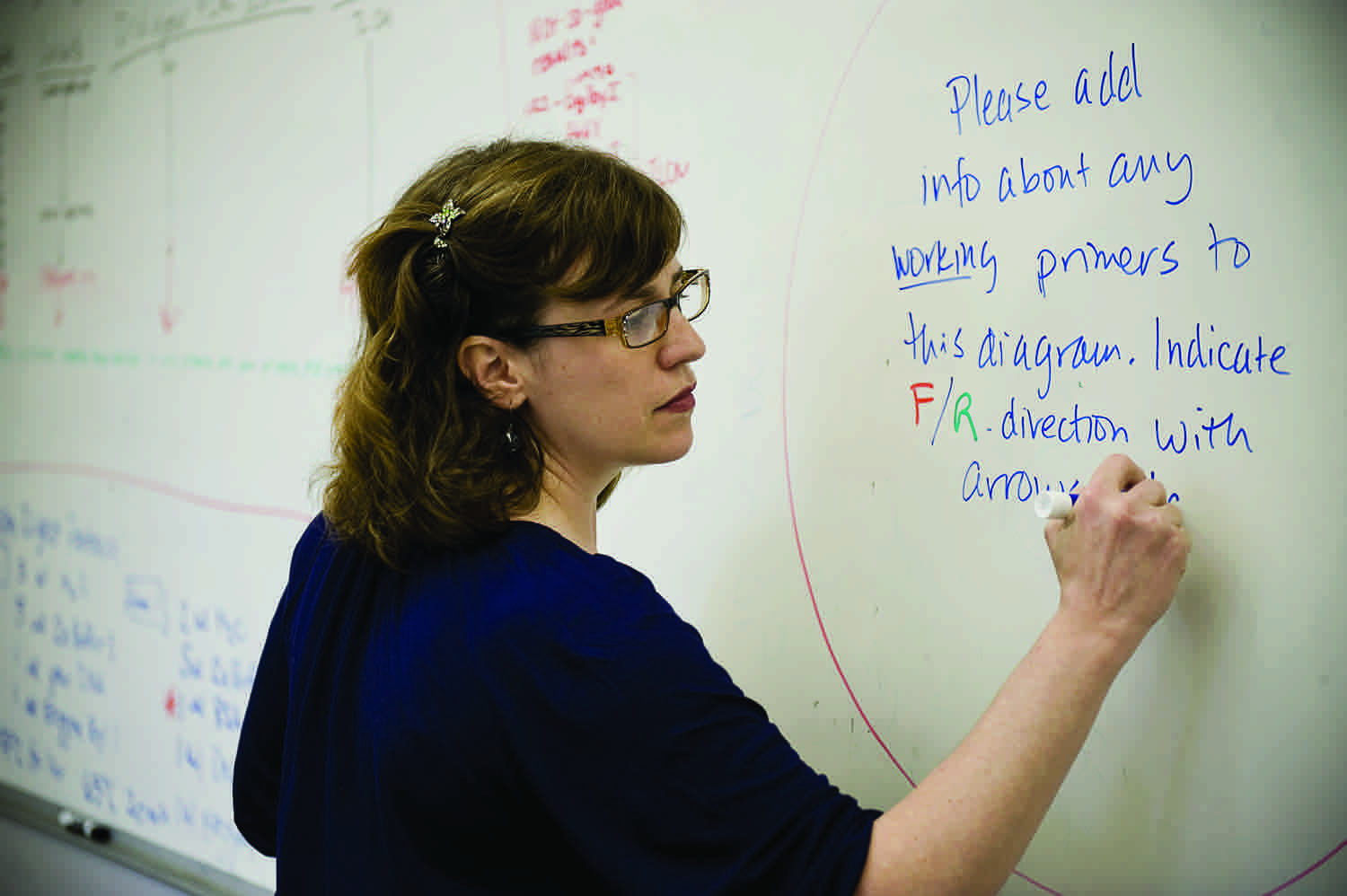
IRIS login | Reed College home Volume 96, No. 2: June 2017
Tags
"Economics"
Econ Major Wins Meier Award for Work on Preference

Sarah Brauner ’16 Won a Meier Award for Distinction in Economics for her thesis on preference theory.
“My thesis was a bit unorthodox for a math-econ thesis in that it was more 'mathy' than 'econ-y'—usually it's the opposite,” shares Sarah Brauner ’16, one of two winners of The Gerald M. Meier Award for Distinction in Economics. After receiving this distinction for her exceptional senior thesis, Sarah is now headed to Smith College's Center for Women in Mathematics for a yearlong post-baccalaureate program.
In her thesis, Sarah used sophisticated mathematical modeling to analyze preference theory, the decision-making rationale that is the backbone of microeconomics. Preference theory evaluates how individuals “make decisions based upon an underlying set of preferences for certain goods,” explains Sarah.
“Suppose that you are trying to learn how I would rank apples, bananas and oranges. You know that I prefer apples and oranges to bananas, but you don't know if I favor oranges over apples or vice-versa,” Sarah demonstrates. Imagine you want to find out her 1st, 2nd, and 3rd favorite of the three; then imagine trying to decipher her ranked preferences with even more types of fruit. Only allowing two fruits to be compared at once, Sarah considered the question-asking process as a sorting algorithm using a “partially ordered set, or poset.” Ultimately, Sarah examined the question-asking processes required to learn an individual’s complete preferences.
Continue reading Econ Major Wins Meier Award for Work on Preference
Economics Grad Pursues Doctorate at Yale
“Indeed, the Bard knew his macroeconomics well!” declares Ayhan Panjwani ’16, an economist with a predilection for Shakespeare and a winner of the Gerald M. Meier Award for Distinction in Economics. Ahyan will begin his doctoral studies in Economics at Yale this fall after receiving recognition for an exceptional senior thesis.
Referring to The Merchant of Venice while describing his research pursuits, Ahyan muses on the deal between Shylock and Antonio for “a pound of flesh and no blood,” highlighting that the character's concern lies within the collateral rather than the interest rate. Similarly, Ayhan will examine collateral and leverage as sources of systemic risk within the economy, moving beyond simply lowering interest rates during a financial crisis.
“Generally, my research interests lie in Macroeconomics with a bend towards finance,” he says. While at Reed, the mathematics-economics grad focused on finance in Brazil for his thesis. “The idea was to determine whether Brazil's current monetary policy is a feasible one given all their troubles in the past few years,” Ayhan details. Citing their failed efforts to maintain inflation, he proposed alternative policies for their economy. At Yale, Ayhan will continue to explore the ways of finance.
Continue reading Economics Grad Pursues Doctorate at Yale
Three Profs Granted Tenure
Congratulations to three members of the Reed faculty who were granted tenure this year:
Prof. Morgan Luker [music]
Prof. Luker joined the music department in 2010 as Reed’s first ethnomusicologist. His research focuses on the cultural politics of Latin American music, with special emphasis on contemporary tango music in Buenos Aires, Argentina. “We often think that aesthetics are just aesthetics, or that a musical style is just a musical style, but music in fact carries a tremendous range of meanings and functions, serving as both a symbol and generator of other forces in social life and history,” he says.
Continue reading Three Profs Granted Tenure
Econ Students Win Ginormous Boardgame Tourney

Triumphant Reed students brandish gamepieces after taking first place in the Pacific Northwest Intercollegiate Ginormous Blokus Tournament.
An undefeated Reed team took first place in the Pacific Northwest Intercollegiate Ginormous Blokus Tournament on Saturday.
The tournament, now in its sixth year, is inspired by the boardgame Blokus, in which players systematically set down blocky geometric tiles on a square grid in an effort to claim territory and prevent their opponents from doing the same. But there’s a twist: the tournament is played on a gargantuan outdoor grid measuring some 400 square feet in area.
The Reed team was drawn from students taking Economics 315, Game Theory, with Prof. Jon Rork. “I like to use Blokus in my class to teach students how to think about strategy in a non-mathematical way,” says Prof. Rork. “When we get to the math, students find it more intuitive.”
Continue reading Econ Students Win Ginormous Boardgame Tourney
Econ Prof Unlocks Puzzles of Human Behavior
Can drought affect domestic violence?
Is sex like driving?
Does foreign aid actually benefit its intended recipients?
These are the kinds of questions that Prof. Nick Wilson ’99 and his students wrestle with every day. And if this doesn’t exactly square up with your ideas about what economists are supposed to do, it’s time you took a fresh look at the discipline.
“If you were an alien observing Earth over thousands of years, what you’d notice is that until about 1820, the entire planet—every nation, every region—was basically poor,” Prof. Wilson says. “And then you see a striking divergence, where some countries get really rich, but others stay poor. I think understanding that phenomenon is the most important thing I can do.”
Continue reading Econ Prof Unlocks Puzzles of Human Behavior
The Economics of the Big Cut
It’s quick, it’s painless, it’s free, and it cuts HIV infection in men by up to 60%.
Voluntary medical male circumcision (VMMC) is a powerful tool for combating HIV in areas with high prevalence rates of the virus, according to the World Health Organization.
Nonetheless, men aren’t typically pounding down the door to get the operation. So government agencies, health workers, and NGOs in South Africa are trying to find ways to encourage more men to undergo the procedure.
Continue reading The Economics of the Big Cut
Econ Prof Wins $99K Grant to Study Johnson Creek
Prof. Noelwah Netusil [economics 1990–] has won a $99,000 grant from the U.S. Department of Agriculture to investigate how the restoration of Johnson Creek has affected local property values.
The grant will provide $99,256 to Reed for a two-year research project supported by a postbac fellow. For this appointment, Prof. Netusil chose Maya Jarrad ’14, an environmental studies-economics graduate, who will update and verify projects in the Johnson Creek Watershed residing in the conservation registry database. Maya utilized this database for her senior thesis, “Valuation of Urban Stream Restoration in the Johnson Creek Watershed: A Repeat Sale Hedonic Hybrid Analysis,” written with Prof. Netusil.
Continue reading Econ Prof Wins $99K Grant to Study Johnson Creek





